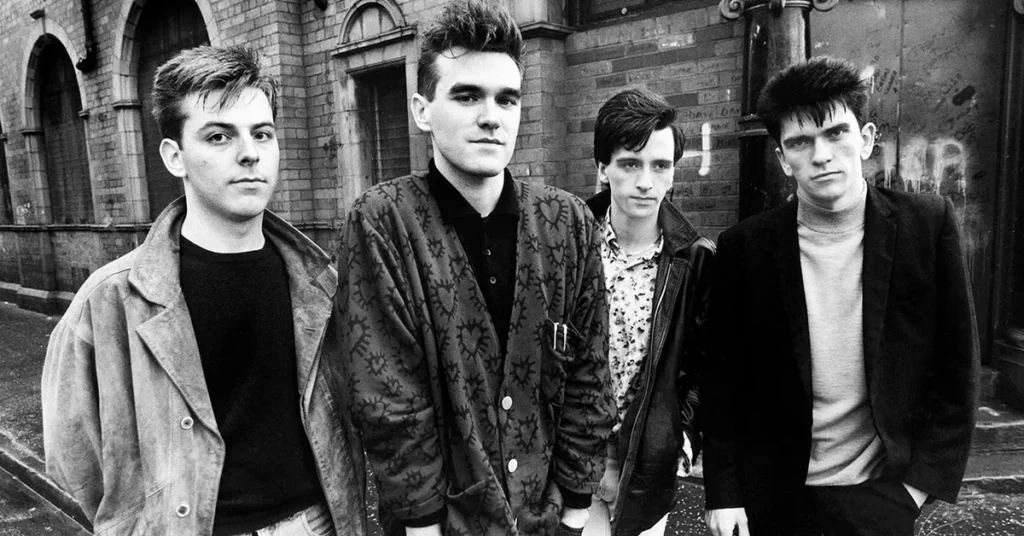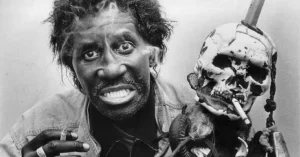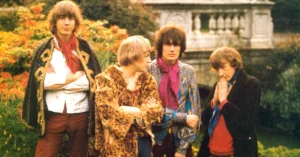The Smiths: Melancholy Mavericks of British Indie Rock
The Smiths. Formation and Origins
Formed: 1982
Origin: Manchester, England
The Smiths. Members:
- Morrissey – Vocals, lyrics
- Johnny Marr – Guitar, songwriting
- Andy Rourke – Bass
- Mike Joyce – Drums
The Smiths formed when Morrissey (a reclusive writer and music obsessive) met Johnny Marr (a brilliant young guitarist) in Manchester. Their contrasting personalities — Morrissey’s romantic pessimism and literary lyrics paired with Marr’s jangly, melodic guitar work — created a unique chemistry.
The name “The Smiths” was chosen as a reaction against extravagant band names — simple, ordinary, and unpretentious.
The Smiths. Debut and Immediate Impact: The Smiths (1984)
Released during a time dominated by synth-pop and glossy production, The Smiths’ guitar-driven, emotionally raw music stood in stark contrast.
✦ The Smiths (1984)
- Gritty, poetic, and full of yearning
- Key tracks:
- “This Charming Man” – A danceable yet enigmatic love song
- “Hand in Glove” – Their debut single; defiant and tender
- “What Difference Does It Make?” – Cynical but catchy
Though not a massive commercial hit, the album captured a disaffected youth culture and signaled the arrival of a major force in British music.
The Smiths. Rise to Cult Hero Status: Hatful of Hollow and Meat Is Murder (1984–1985)
✦ Hatful of Hollow (1984)
- A compilation of BBC sessions and singles, considered by many fans to be essential
- Featured rawer, sometimes better versions of early songs
- Included: “Heaven Knows I’m Miserable Now,” “How Soon Is Now?” — a hypnotic, delay-soaked anthem of alienation
✦ Meat Is Murder (1985)
- Their only UK #1 album
- More political and confrontational
- Tracks like:
- “The Headmaster Ritual” – Against corporal punishment
- “Meat Is Murder” – A vegetarian anthem
- “That Joke Isn’t Funny Anymore” – Wounded and beautiful
The Smiths were now seen as the poetic conscience of a generation — witty, miserable, and defiantly sincere.

The Smiths. Peak Creativity: The Queen Is Dead (1986)
This album is widely considered their masterpiece — musically adventurous, lyrically sharp, and emotionally resonant.
✦ The Queen Is Dead (1986)
- Marr’s lush arrangements and Morrissey’s barbed wit were in perfect balance
- Key tracks:
- “There Is a Light That Never Goes Out” – A gothic love song with symphonic sweep
- “Bigmouth Strikes Again” – Punky and sarcastic
- “I Know It’s Over” – Devastating ballad of unrequited love
- “The Boy with the Thorn in His Side,” “Cemetry Gates”
A landmark in British rock, it later influenced Radiohead, Oasis, The National, and countless indie bands.
Final Album and Breakup: Strangeways, Here We Come (1987)
✦ Strangeways, Here We Come (1987)
- Released posthumously after the band broke up
- Showed signs of new musical directions
- Songs like:
- “I Started Something I Couldn’t Finish”
- “Last Night I Dreamt That Somebody Loved Me”
The band disbanded amid tensions between Morrissey and Marr, and creative exhaustion. Marr left, unable to deal with Morrissey’s controlling vision and erratic decisions.
After the Breakup
✦ Morrissey
- Launched a successful solo career with albums like Viva Hate and You Are the Quarry
- Remains a polarizing figure, respected for his talent but criticized for controversial political views
✦ Johnny Marr
- Played with The The, Electronic (with New Order’s Bernard Sumner), Modest Mouse, and later released solo work
- Revered as one of Britain’s greatest guitarists
✦ Rourke and Joyce
- Participated in various projects; Joyce later won a legal battle over royalties in the 1990s
Despite numerous rumors and offers, The Smiths never reunited — Morrissey and Marr remain estranged.
Musical Style and Lyrical Themes
Musically:
- Marr’s guitar style combined jangly arpeggios, Byrds-inspired riffs, and R&B rhythms
- Sparse arrangements, no synths, classic yet modern
Lyrically:
- Morrissey drew from Oscar Wilde, kitchen-sink realism, romantic poets, and 1960s pop culture
- Themes included:
- Alienation and depression
- Unrequited love
- Death, class, cruelty
- Sexual ambiguity and British identity
- Sharp critiques of social norms and Thatcher-era politics
They created a melancholic yet witty world, where loneliness was poetic and irony was armor.
Legacy and Influence
The Smiths are considered one of the most important bands in alternative music history, influencing:
- Radiohead
- The Stone Roses
- Oasis
- Blur
- Belle & Sebastian
- The National
- Arctic Monkeys
Their music paved the way for Britpop, indie pop, and shoegaze, while Morrissey became a template for the wounded yet charismatic frontman.
Accolades:
- Frequently appear in “Best Albums of All Time” lists
- “There Is a Light That Never Goes Out” is regularly named among the greatest songs ever written
- Cult following remains passionate and international
Interesting Facts
- Morrissey was famously celibate during the band’s peak years and rarely gave interviews
- Johnny Marr played every instrument on some Smiths tracks except drums
- The band’s album covers often featured iconic black-and-white film stills and cultural figures (e.g., Alain Delon, Truman Capote)
- The Smiths never had a UK #1 single, yet they are regarded as the quintessential British indie band






